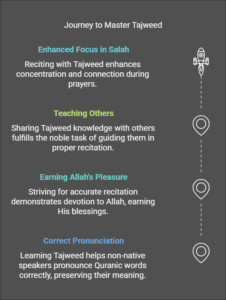The Holy Quran is the eternal word of Allah (SWT), revealed to Prophet Muhammad (PBUH) as a comprehensive guide for humanity. It contains divine wisdom, laws, and guidance for leading a righteous life. However, reciting the Quran is not just about reading its words—it is about understanding, reflecting, and adhering to the rules of Tajweed to ensure the Quran’s eloquence and meaning are preserved.
In this article, we’ll explore what Tajweed is, why it is important, and how you can learn Tajweed to elevate your recitation and deepen your connection with Allah (SWT).
What is Tajweed?
Tajweed, derived from the Arabic root word “jawwada” (to make better or improve), refers to the set of rules governing the pronunciation, articulation, and recitation of the Quran. It ensures that every letter is pronounced correctly, with its proper qualities, and that the Quran is recited as it was revealed to Prophet Muhammad (PBUH).
Tajweed is not merely about improving pronunciation—it’s a means to preserve the Quran’s divine meaning, beauty, and rhythm.
Key Aspects of Tajweed:
- Makharij al-Huruf (Articulation Points): Proper pronunciation of letters from their correct points of articulation.
- Sifaat al-Huruf (Characteristics of Letters): Understanding the attributes of each letter, such as heaviness, lightness, or nasal sounds.
- Rules of Prolongation (Madd): Knowing where and how long to elongate specific sounds.
- Rules of Stopping (Waqf): Understanding when and where to stop or pause during recitation for proper meaning.
Why is Tajweed Important in Quran Recitation?

The Quran is not an ordinary book—it is the divine speech of Allah (SWT). As Muslims, we are entrusted with the responsibility of reciting it with care and reverence. Tajweed is essential because:
1. It Preserves the Meaning of the Quran
Incorrect pronunciation can alter the meaning of Quranic verses, leading to unintended errors. For example:
- The word قلب (qalb) means “heart,” but if pronounced as كلب (kalb), it changes to “dog.”
Tajweed ensures that the Quran’s meaning remains accurate, preventing such mistakes.
2. It Honors the Quran as Allah’s Word
Reciting the Quran with Tajweed reflects your reverence for Allah (SWT). It is a form of worship and shows your dedication to preserving the beauty and sanctity of His divine words.
“And recite the Quran with measured recitation.” (Surah Al-Muzzammil: 73:4)
3. It Enhances Spiritual Connection
When the Quran is recited with Tajweed, its beauty and eloquence are magnified. This enhances your emotional and spiritual connection with Allah (SWT), allowing you to reflect deeply on the meaning of the verses.
4. It Brings Immense Rewards
The Prophet Muhammad (PBUH) said:
“The one who is proficient in the recitation of the Quran will be with the honorable and obedient scribes (angels), and he who recites the Quran and finds it difficult to recite, doing his best to recite it in the best way possible, will have a double reward.” (Sahih Muslim)
Even if you struggle to recite the Quran with Tajweed, your efforts are rewarded abundantly by Allah (SWT).
Also Read: 4 Best Ways for Kids to Learn Quran Online With Tajweed
Benefits of Learning Tajweed

1. Correcting Mistakes in Recitation
For non-native Arabic speakers, mispronunciations are common and can change the Quran’s meaning. Learning Tajweed helps you identify and correct such errors, ensuring proper recitation.
2. Gaining the Pleasure of Allah (SWT)
By striving to recite the Quran as it was revealed, you demonstrate devotion and obedience to Allah (SWT), earning His blessings and pleasure.
3. Becoming a Source of Guidance for Others
With Tajweed knowledge, you can teach your children, family, or community to recite the Quran properly. As the Prophet (PBUH) said:
“The best of you are those who learn the Quran and teach it to others.” (Sahih al-Bukhari)
4. Enhancing Focus in Salah
Understanding and reciting Quranic verses with Tajweed improves your focus and connection during Salah, enriching your worship experience.
How to Learn Tajweed

Learning Tajweed may seem challenging at first, but with the right resources and dedication, anyone can master it. Here are some effective ways to learn Tajweed:
1. Enroll in an Online Tajweed Course
Online Tajweed courses are ideal for beginners and advanced learners alike. They offer flexibility, personalized lessons, and access to qualified teachers.
At The Quran Courses Academy, our Best Online Tajweed Course includes:
- One-on-one sessions with certified Tajweed teachers.
- Comprehensive lessons on Makharij, Sifaat, Madd, and more.
- Regular practice and assessments to track progress.
- Free trial classes to experience the quality of teaching.
2. Listen to Renowned Quran Reciters
Listening to renowned Qaris (reciters) like Sheikh Sudais or Sheikh Mishary Rashid helps you understand the rhythm, pronunciation, and flow of Quranic recitation with Tajweed.
3. Practice Daily
Consistent practice is the key to mastering Tajweed. Dedicate a specific time each day to recite and apply the rules you’ve learned.
4. Use Tajweed Apps and Resources
Leverage technology by using Tajweed apps, videos, and tutorials to supplement your learning. Many resources provide visual and audio aids for better understanding.
Also Read: How to Choose the Best Online Tajweed Course
FAQs About Tajweed in Quran Recitation
1. Is Tajweed mandatory for all Muslims?
Yes, reciting the Quran with Tajweed is obligatory to preserve its meaning and sanctity. However, learning Tajweed is a gradual process, and your efforts are rewarded by Allah (SWT).
2. Can children learn Tajweed?
Absolutely! It’s ideal to introduce Tajweed to children at a young age when their minds are more receptive to learning.
3. How long does it take to learn Tajweed?
The time required depends on your dedication and consistency. With regular practice and guidance, most learners can master basic Tajweed rules within a few months.
4. Can I learn Tajweed online?
Yes, online Tajweed courses are an effective way to learn from expert teachers at your convenience.
5. What is the difference between Tajweed and Tarteel?
- Tajweed: Refers to the rules of pronunciation and recitation.
- Tarteel: Refers to the slow, rhythmic, and measured recitation of the Quran.
Conclusion: Elevate Your Quran Recitation with Tajweed
Tajweed is not just about correct pronunciation—it is a form of worship that honors the sanctity of the Quran. By learning Tajweed, you protect the divine meaning of Allah’s words, enhance your spiritual connection, and fulfill your duty as a Muslim.
📚 Ready to master Tajweed? Join our Best Online Tajweed Course today and start your journey toward perfect Quranic recitation!



